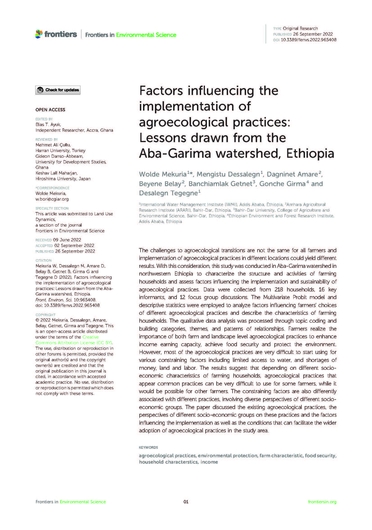Factors influencing the implementation of agroecological practices: lessons drawn from the Aba-Garima watershed, Ethiopia
Abstract
The challenges to agroecological transitions are not the same for all farmers and implementation of agroecological practices in different locations could yield different results. With this consideration, this study was conducted in Aba-Garima watershed in northwestern Ethiopia to characterize the structure and activities of farming households and assess factors influencing the implementation and sustainability of agroecological practices. Data were collected from 218 households, 16 key informants, and 12 focus group discussions. The Multivariate Probit model and descriptive statistics were employed to analyze factors influencing farmers’ choices of different agroecological practices and describe the characteristics of farming households. The qualitative data analysis was processed through topic coding and building categories, themes, and patterns of relationships. Farmers realize the importance of both farm and landscape level agroecological practices to enhance income earning capacity, achieve food security and protect the environment. However, most of the agroecological practices are very difficult to start using for various constraining factors including limited access to water, and shortages of money, land and labor. The results suggest that depending on different socioeconomic characteristics of farming households, agroecological practices that appear common practices can be very difficult to use for some farmers, while it would be possible for other farmers. The constraining factors are also differently associated with different practices, involving diverse perspectives of different socioeconomic groups. The paper discussed the existing agroecological practices, the perspectives of different socio-economic groups on these practices and the factors influencing the implementation as well as the conditions that can facilitate the wider adoption of agroecological practices in the study area.

